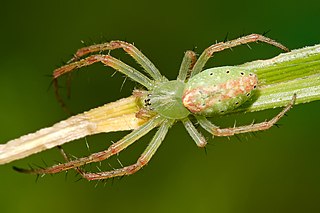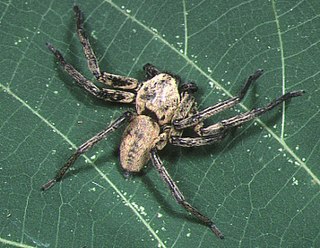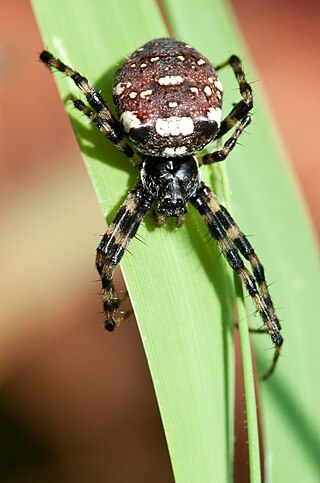
Uropygi is an arachnid order comprising invertebrates commonly known as whip scorpions or vinegaroons. They are often called uropygids. The name "whip scorpion" refers to their resemblance to true scorpions and possession of a whiplike tail, and "vinegaroon" refers to their ability when attacked to discharge an offensive, vinegar-smelling liquid, which contains acetic acid. The order may also be called Thelyphonida. Both names, Uropygi and Thelyphonida, may be used either in a narrow sense for the order of whip scorpions, or in a broad sense which includes the order Schizomida.

Gasteracantha is a genus of orb-weaver spiders first named by Carl Jakob Sundevall in 1833. Species of the genus are known as spiny-backed orb-weavers, spiny orb-weavers, or spiny spiders. The females of most species are brightly colored with six prominent spines on their broad, hardened, shell-like abdomens. The name Gasteracantha is derived from the Greek gaster (γαστήρ), meaning "belly, abdomen", and akantha (άκανθα), meaning "thorn, spine". Spiny-backed orb-weavers are sometimes colloquially called "crab spiders" because of their shape, but they are not closely related to the true crab spiders. Other colloquial names for certain species include thorn spider, star spider, kite spider, or jewel spider.

Heteropoda is a genus of spiders in the family Sparassidae, the huntsman spiders. They are mainly distributed in tropical Asia and Australia, while at least one species, H. venatoria, has a cosmopolitan distribution, and H. variegata occurs in the Mediterranean.

Cyrtophora, the tent-web spiders, is a genus of orb-weaver spiders first described by Eugène Simon in 1895. Although they are in the "orb weaver" family, they do not build orb webs. Their tent-like, highly complex non-sticky web is sometimes considered a precursor of the simplified orb web. These webs are aligned horizontally, with a network of supporting threads above them. These spiders often live in colonies. Females have a body length of mostly about 10 millimetres (0.39 in) long. Some members, including Cyrtophora cicatrosa, exhibit the ability to change colour rapidly.

Thelcticopis is a genus of huntsman spiders that occurs almost exclusively in the area India to Japan to New Guinea and Fiji. However, one species occurs in Costa Rica, and another in Congo basin, although the latter species is probably misplaced in this genus.

Gea is a genus of orb-weaver spiders first described by C. L. Koch in 1843.

Hypoctonus is a genus of Thelyphonid whip scorpions, first described by Tamerlan Thorell in 1888.

Phlogiellus is a genus of tarantulas that was first described by Reginald Innes Pocock in 1897. They are found throughout Asia and Papua New Guinea, including Indonesia, the Philippines, Papua New Guinea, China, Myanmar, Malaysia, Borneo, Thailand, the Solomon Islands and Taiwan. Phlogiellus is part Latin and part Greek, the first part being "φλóξ φλoγóϛ", meaning flame, the second part being "ellus" which is a latin diminutive suffix.

Anepsion is a genus of orb-weaver spiders first described by Embrik Strand in 1929.
Sarax is a genus of amblypygids of the family Charinidae.
Bowie is a genus of Ctenidae that was described by Peter Jäger in 2022. The genus was named after the English singer-songwriter and actor David Bowie and currently encompasses 107 species, 55 of which were named after elements from David Bowie's musical catalogue.









